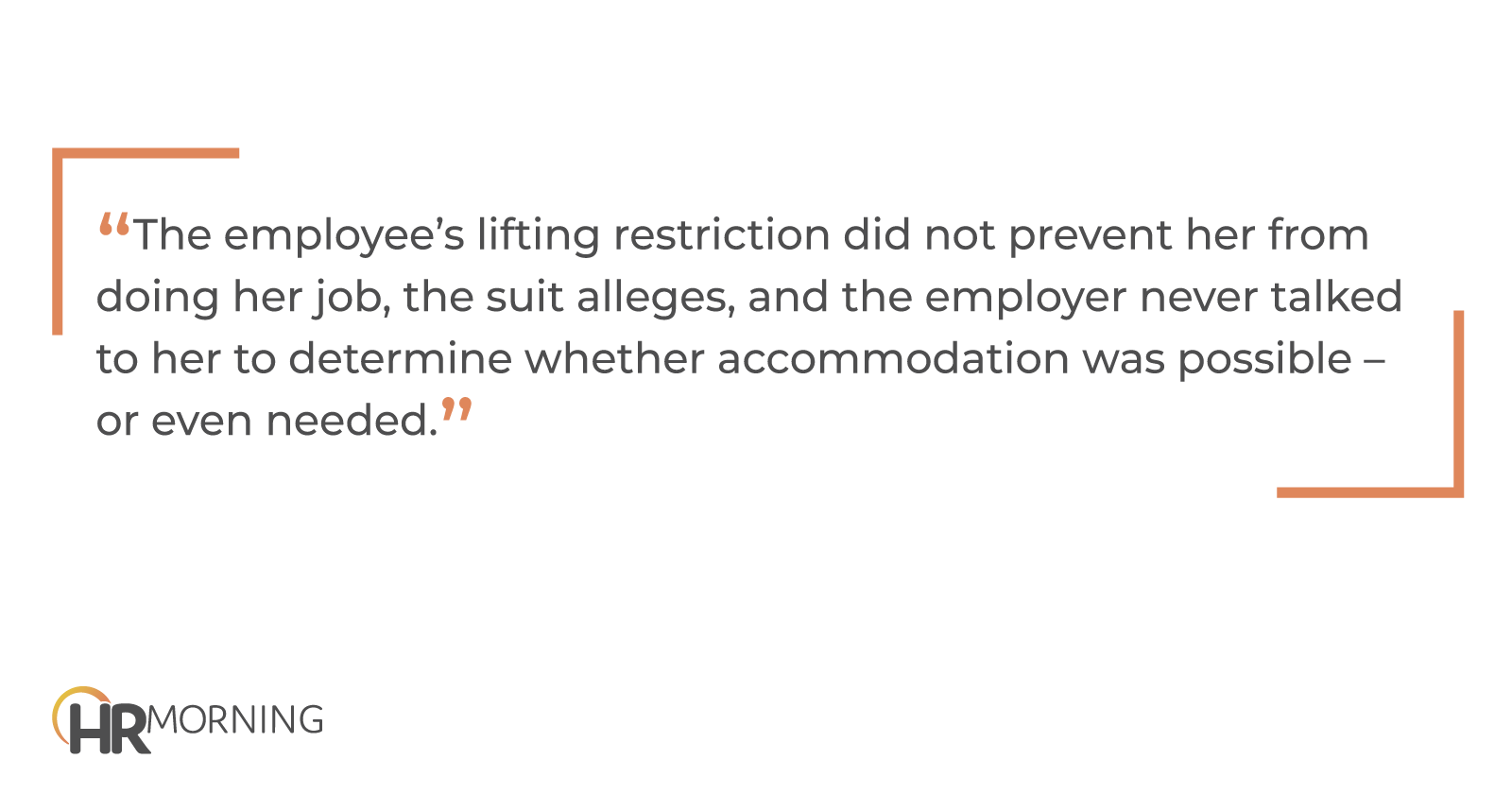A newly filed lawsuit says a New Jersey nursing home’s job termination of a longtime worker violated the Americans with Disabilities Act (ADA).
The employee’s lifting restriction did not prevent her from doing her job, the suit alleges, and the employer never talked to her to determine whether accommodation was possible – or even needed.
The U.S. Attorney’s Office for the District of New Jersey filed the suit against Roosevelt Care Centers, which is operated by a New Jersey public corporate body.
Roosevelt had two facilities, both in New Jersey.
The employee, whom the government’s suit does not name, began working in the laundry unit at one of the facilities in 1998.
When the laundry unit at that location closed in 2013, the employee moved to the other location. There, she took a position as a dietary worker.
Her new job involved working in the kitchen, preparing meals for facility residents. More specifically, she assembled meals onto trays, which were then loaded onto carts and delivered to patients’ rooms by porters. She also cleared trays that were returned to the kitchen from the rooms.
In early April 2016, the employee injured her right wrist and elbow while using a dishwasher at work.
A hand specialist diagnosed cartilage tear symptoms in the wrist and elbow, and the employee missed 56 days of work.
Job termination violates ADA, suit says
She was medically cleared to return to work with no restrictions at the start of June 2016.
Unfortunately, pain in the right elbow returned in September of the same year, this time accompanied by right shoulder pain. The hand specialist imposed a three-pound lifting restriction and said the employee could perform light-duty work.
The suit says the nursing home told the employee that it could not accommodate the lifting restriction and that she could not return to work.
A few weeks later, near the end of September, the hand specialist again cleared the employee to return to work with no restrictions.
Employer requires FCE
The nursing home then directed the employee to undergo a functional capacity exam. A third-party provider conducted the exam, basing its assessment on a job title listed within the Dictionary of Occupational Titles. That is a publication maintained by the federal Department of Labor.
Following that assessment, the provider concluded that the employee had a permanent lifting restriction of 20 pounds. It also determined that she could perform several functions performed by dietary workers.
After that assessment, the hand specialist cleared the employee to work with a permanent 20-pound lifting restriction.
According to the suit, an HR representative and administrative assistant at the nursing home told the employee they could not accommodate the lifting restriction – and terminated her employment because of it.
The suit asserts a single cause of action for alleged violation of Title I of the ADA, which bans disability discrimination in employment.
Varied relief sought
As relief, it seeks to enjoin the nursing home from engaging in discriminatory employment practices. It also asks the court to order the nursing home to modify its policies and procedures relating to Title I of the ADA, and to further order the nursing home to provide relevant training to its supervisors and HR staff.
It further seeks back pay, the value of any lost benefits, and compensatory damages.
The suit paints a picture of a classic ADA mistake: Declining to engage in a good-faith, interactive process to determine whether a disability-related accommodation can enable the performance of essential job functions – and more basically, to determine whether such an accommodation is even needed.
The suit’s allegations further implicate the need on the part of employers to fairly and accurately assess what the truly “essential” functions of a position are – and whether an employee’s (or job applicant’s) disability renders them unable to perform them, with or without accommodation.
What makes a job function ‘essential’?
To determine whether a job function is essential, ask these questions:
- Does the position exist to perform the function?
- How many employees are available to perform the function?
- How much skill or expertise does the function require?
Written job descriptions can provide evidence as to whether a particular job function is essential.
Other relevant evidence, according to the EEOC, includes:
- The actual work experience of others in the job.
- The time spent performing the function. (Remember, though, that a function can be essential even if it is rarely performed.)
- The consequences of not having the function performed, and
- The terms of any applicable collective bargaining agreement.
If a job function is truly essential and the employee cannot perform it even with accommodation, the employee is essentially unqualified for the job. If that is the case — and reassignment to a vacant position is not a viable option — then an adverse action, such as termination, is unlikely to run afoul of ADA requirements.
But a knee-jerk conclusion that a particular disability-related restriction renders an employee with a disability unqualified – either because it is based on unfounded assumptions or a “This is the way we’ve always done things” mentality – is a sure recipe for ADA liability.
United States of America v. Roosevelt Care Centers (D.N.J. complaint filed 3/20/23).


